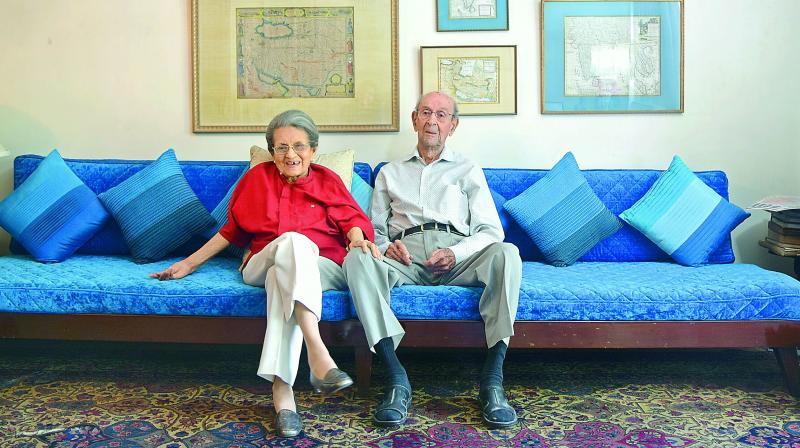Love story that stood the test of time and lasted until death

While trying to help a Hyderabadi film maker, Dulam Satyanarayana, I ran into Uttara Coorlawala, a Professor of Dance at Barnard College in New York. Was she related to the famous Doctor Coorlawala? Uttara said her late father, Khushro, was the son of the doctor. Later, I went to meet Uttara’s mother, Mithoo in her flat in Malabar Hill, very near Hyderabad Estate, where the Nizam once had a guest house.
Feisty centenarian
For someone who is 100 years old, Mithoo had a steady gait and a confident voice.
Her father, Nadirsha Chenoy, was a well known lawyer. An indulgent father, he allowed his children to skip school on days of good weather; Mithoo, with her sisters Freny and Firoze, would then lie on carpets in the garden of their vast estate. Mithoo had a keen interest in studies and received the Nizam’s Scholarship to study at the University of Cambridge: for a “degree in English Literature at the Newham College, to be followed by a Diploma in Education”.
In England, Mithoo faced class and gender prejudice. Educationists there believed that women should be taught only the basics of reading, writing, and arithmetic; much emphasis was placed on skills such as needlework. Others felt that women who studied would not be attached to their home. One even said that too much knowledge could affect women’s fertility!
At Newnham College, much excitement was in store. The male students at Cambridge did not want the women to have the same degrees, and revolted, and rioted. So, Mithoo could not get her degree in her hand. It had to be delivered by post. The irony of her getting a scholarship from the Nizam in whose dominion women were thought to be backward and landing in England where they had such outdated views about women was not lost on her.
Back in Hyderabad, Mithoo went to Mahbubia School to teach. Then she got married. Of her husband, she narrates a curious incident.
Underage driver
Dr Coorlawala, known later as Nawab Rustom Yar Jung, was the superintendent of Osmania Hospital. He had to attend on the Nizam daily. On one occasion, he was late. The Nizam wanted to know why. The doctor explained that his son drove him to see the Nizam. “How old is he?”, the Nizam asked.
On being told the son’s age, the Nizam wondered, “If he is only 14, how can he drive?”. The Nizam meant that the son was not old enough to drive. The doctor, however, interpreted the question to mean how the son was able to drive. He answered accordingly. “My driver taught him to drive”.
The Nizam sent for the son. Khushro, who was waiting outside, arrived, trembling. The Nizam addressed him “I hear that you drove the car today”. Mithoo’s husband, Khushro, then only a gangly lad, nodded his head, and looked down. “Do you know that you need a licence to drive in Hyderabad?”, the Nizam asked. Khushro was silent. The Nizam asked for a blank sheet of paper, then turned to the Kotwal, who was standing by watching this conversation. Giving the sheet to the Kotwal, the Nizam said, “Now, write down on this paper, that you, the Kotwal, are issuing a licence to Khushro Coorlawala”. And it was thus, that Khushro obtained his driving licence, while being underage, directly from the Kotwal, in the presence of the Nizam, and to his father’s astonishment.
Love has to wait for war
How did they get married? “Growing up in Hyderabad, we knew each other as children. We would play together, and attended each other’s birthdays. Our eyes said what our lips couldn’t utter. When I went to Cambridge, I was 19 and we didn’t speak for long periods of time. After I returned, one afternoon I was in my father’s garden, and Khushro went past me to meet my father to ask for my hand. When my father said it was my decision, Khushro popped the question. A few months later, we were married and he joined the army and went to Burma. We could only communicate through letters- every one of them reached me months after he’d written them. Those times were very difficult”. When the war ended, Mithoo met Khushro at the Guwahati station. He was almost bald, and his skin had turned pale yellow. Would she still even love him? But when he saw her, she embraced him and said, “You’ve never looked more handsome.” What did she think of Indian independence? About Police Action?
“We in Hyderabad lived a charmed life. We had almost no knowledge of what was going on outside. In retrospect, I think Hyderabad already was what India wanted to be. I feel sad that what we had got dismantled later on”.
“Khushro had served under British officers. Some of his colleagues went to Pakistan. Later, while serving in Kashmir, he had to fire on people who had even shared his bunker. Sometimes, as they knew one another, they would exchange messages over the wireless. Funnily, they would even decide when to start and stop firing, especially if it was a cold day,” she reminisces.
Does she ever want to go Hyderabad again? “No, it has all changed, I hear. I can only remember it as a magical place.” “I will say this: in our Hyderabad, time stood still”.
Arvind Acharya is a management consultant in New York. He can be reached at arvindach@gmail.com.

